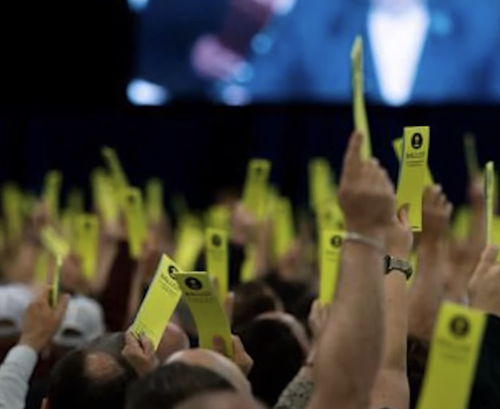To recap: Last week’s heavily-covered Southern Baptist Convention (SBC) gathering was without doubt a watershed (pun intended) for America’s largest Protestant denomination.
The local church “messengers” gathered in New Orleans not only expelled congregations that ordain female clergy but passed a constitutional amendment (that needs second approval next year) restricting SBC affiliation to congregations that allow “only men as any kind of pastor or elder.” That blocks any suggestion that females could perform pastoral roles apart from being head pastor of a congregation.
Amid all the gender excitement — and the SBC’s struggle to cope with sexual abuse scandals — the media should not neglect decisive rejection of the long Baptist tradition to uphold shared classical Christian doctrines, such as those in the 1833 New Hampshire Confession of Faith (.pdf), but leave most matters up to decisions by autonomous congregations.
Journalists might consider that current SBC teaching on women in the church and the home is in lockstep with the fundamentalist Baptist Bible Fellowship International of Springfield, Missouri. Yet that denomination also proclaims the old-fashioned belief that “the local church has the absolute right of self-government, free from the interference of any hierarchy of individuals or organizations.” Then again, the emerging SBC stance is similar to those of Rome, Eastern Orthodoxy and large numbers of Anglicans and Lutherans in the Global South.
Will the media now find any sizable breakaway from the SBC, as opposed to a predictable loss of some disgruntled individuals and scattered congregations? Doesn’t appear so in the early aftermath. The “moderates” have been leaving — slowly — for decades.
That contrasts with the ongoing split in the second-largest U.S. denomination, the United Methodist Church (UMC), over various issues of biblical authority and especially sexual morality.
Local and state news media have been covering the action, but The Guy thinks there’s ample room for comprehensive analysis of the over-all national and international situation. Mainstream journalists have consistently avoided covering important non-LGBTQ+ doctrinal issues linked to this war.
The establishment’s semi-official running tally posted here shows that what some called a “trickle” has become a flood, with (as this is written) 5,864 congregations quitting since 2019, of which 3,861 departed this year.










